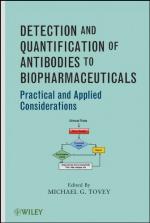|
This section contains 678 words (approx. 3 pages at 300 words per page) |

|
An antigen is any substance that provokes a response by the body's immune system. An antibody is a protein manufactured by the body to neutralize a specific invading antigen.
Before the 1880s, not much was known about the specific components and workings of the immune system. During the 1880s, researchers found that both diphtheria and tetanus were caused by a toxin produced by the disease bacillus and that the body responded by producing a neutralizer, or antitoxin. In 1890 Emil von Behring and Shibasaburo Kitasato, working in Robert Koch's laboratory in Berlin, Germany, showed that guinea pigs became immune to diphtheria or tetanus toxins if they had been injected with serum from an already immune animal. From this, von Behring concluded that immunity was conferred by protective substances in the blood, which he called antitoxins, or antibodies, and that these substances were very specific, protecting...
|
This section contains 678 words (approx. 3 pages at 300 words per page) |

|


